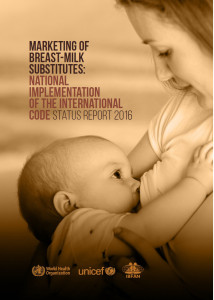Launch of new WHO/UNICEF/IBFAN Report:
Breast-milk Substitutes: National Implementation of the International Code Status Report 2016
Followed by showing of Tigers
WHO, UNICEF and IBFAN are hosting an evening of discussion on national implementation of the International Code of Marketing of Breast-milk Substitutes and subsequent relevant WHA resolutions[1].
9 May 2016 17:00 – 20.15 Club Suisse de la Presse/Geneva Press Club, Grande Salle de Conference, 106, route de Ferney, 1202 Genève and via live stream
Breastfeeding is unparalleled in providing the ideal food for infants:
- breastmilk contains antibodies that protect against many common childhood illnesses;
- increasing breastfeeding rates could save more than 820 000 lives each year;
- breastfed children perform better on intelligence tests, are less likely to be overweight or obese, and less prone to diabetes later in life;
- increasing breastfeeding rates could prevent an estimated 40 000 breast cancer deaths per year.
In spite of its critical importance as the cornerstone of child health and survival, aggressive and inappropriate marketing of breast-milk substitutes, and other food products that compete with breastfeeding, continues to mislead parents and undermine efforts by Member States to protect and support children’s rights to health and ensure sound objective information.
Implementation through effective regulation of the International Code of Marketing of Breast-milk Substitutes, adopted by the World Health Assembly in 1981, and the subsequent relevant WHA resolutions is essential if inappropriate marketing practices are to be eliminated.
WHO, UNICEF and IBFAN have prepared the first joint global report on the status of the Code in 194 countries. The report presents the legal status of the Code, including to what extent Code provisions have been incorporated in national legal measures, and provides information on the efforts made by countries to monitor and enforce the Code through the establishment of formal mechanisms.
To enhance support to countries for International Code implementation, WHO has formed a network of UN, civil society, and academic organizations. Called NetCode, this partnership is developing protocols and tools for Code monitoring and enforcement, providing direct technical assistance to countries, and advocating for complete adherence to the International Code.
Agenda
17:00 Aperitif
17:30 Welcome by the moderator Ms Robin Gorna, Executive Director, Partnership for Maternal, Newborn and Child Health
17:35 – 17:40 New evidence on the benefits of breastfeeding Dr Nigel Rollins, Scientist, Maternal, Newborn, Child and Adolescent Health, WHO
17:40 – 17:50 Marketing of Breast-milk Substitutes: National Implementation of the International Code, Status Report 2016 Dr Laurence Grummer-Strawn, Technical Officer, Nutrition for Health and Development, WHO
17:50 – 17:55 Introduction of NETCODE: The Network for Global Monitoring and Support for Implementation of the International Code of Marketing of Breast-milk Substitutes and Subsequent Relevant WHA Resolutions Dr Francesco Branca, Director, Nutrition for Healthy Development, WHO
17:55 – 18:00 The International Code, Human Rights and the SDGs Ms Marilena Viviani, Director, Geneva Liaison Office, Public Partnership Division, UNICEF
18:00 – 18:05 The importance of independent, on-the-ground monitoring and effective enforcement Mr Mike Brady, Campaigns and Networking Coordinator, Baby Milk Action/IBFAN
18:05 – 18:30 Discussion and Closing
The event will be followed by a showing of the movie “Tigers”, sponsored by IBFAN
18:30 – 18:45 Refreshments
18:45 – 20:15 Movie: “Tigers”, award-winning feature film by Danis Tanovic, dramatizing the true story of a formula company representative blowing the whistle on violations in Pakistan
Introduced by Ms Patti Rundall, Policy Director, Baby Milk Action/IBFAN-UK
[1] The International Code and WHA resolutions must be read together and are referred to as the International Code.UNICEFWHOIBFAN


Pingback: Universal Breast-Feeding Goals Blocked by Industry, Report Suggests | passblue